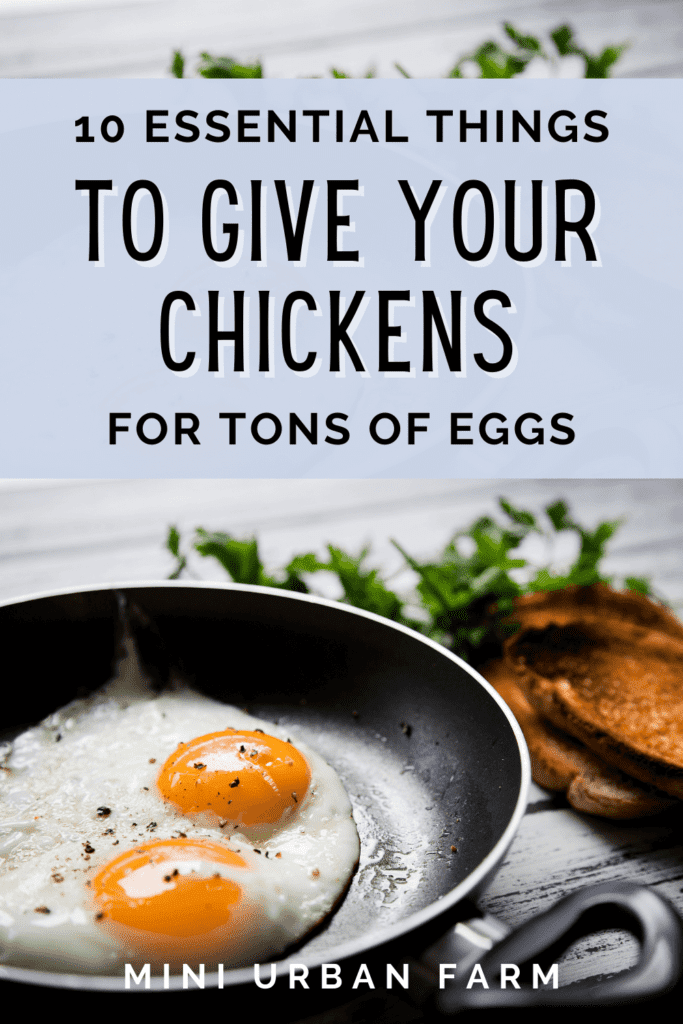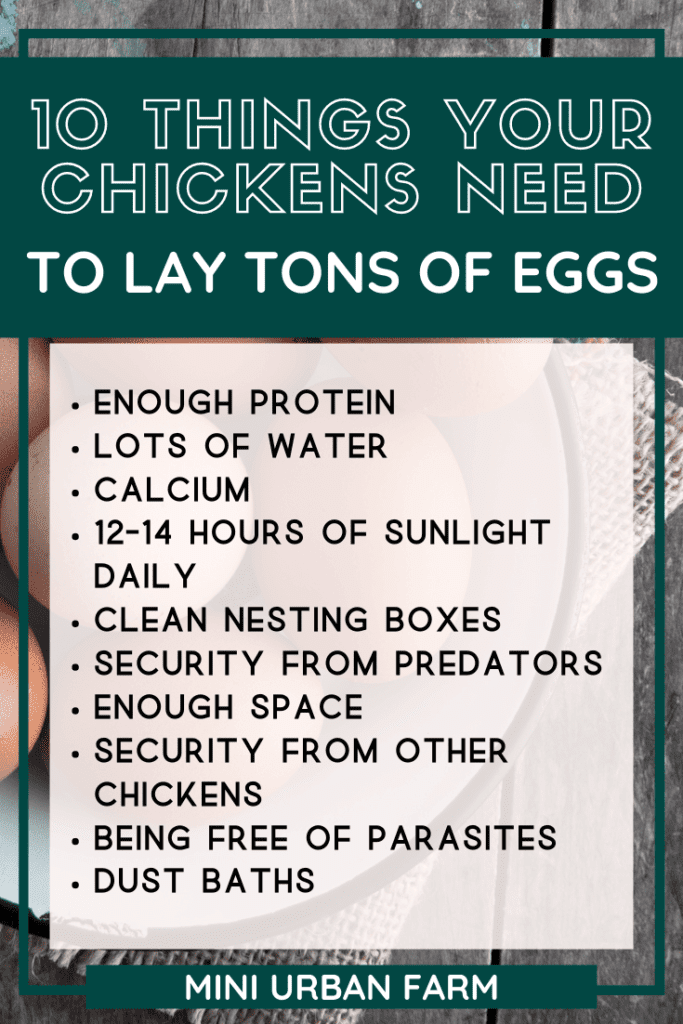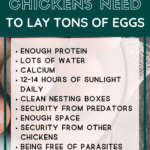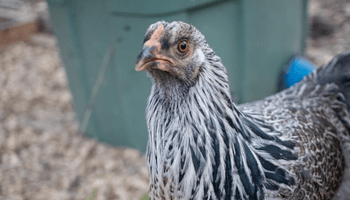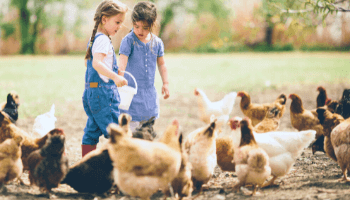There’s nothing like collecting fresh eggs every day from your backyard hens. Not only are fresh eggs healthier, but chicken keeping is a great hobby for urban homesteaders! For new chicken keepers, though, raising farm fresh eggs can come with a learning curve. So I’ve compiled the 10 things chickens need to lay eggs to help you get started!
Things Chickens Need to Lay Eggs:
- Enough Protein
- Lots Of Water
- Calcium
- 12-14 Hours Of Sunlight Daily
- Clean Nesting Boxes
- Security From Predators
- Enough Space
- Security From Other Chickens
- Being Free Of Parasites
- Dust Baths
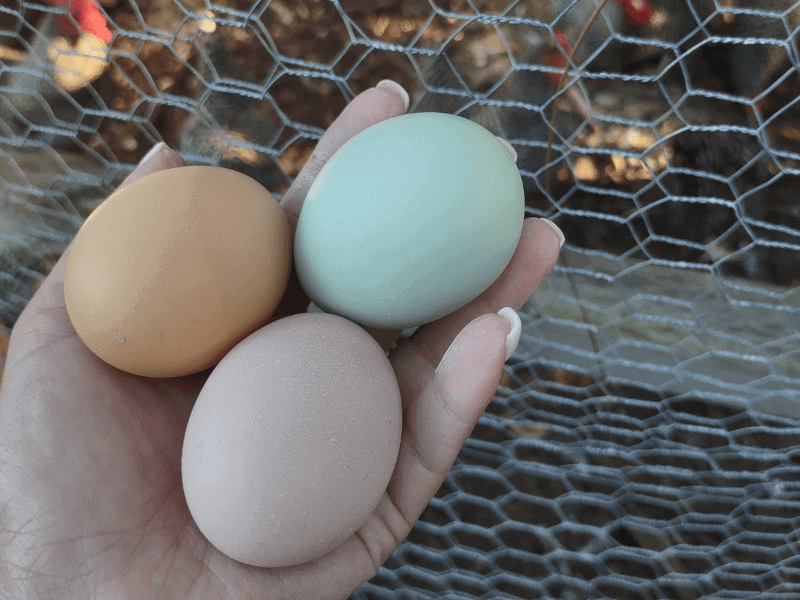
Disclosure: This post may contain affiliate links. If you purchase a product through one of our affiliate links we make a small commission from the sale at no extra cost to our readers.
Things chickens need to lay eggs
Even though chickens are super hardy creatures, they can also be pretty sensitive when it comes to their egg laying abilities!
So while you can expect an average hen to lay about 3-5 eggs per week, you won’t be getting any eggs if a hen is stressed!
And because of that, “Why has my chicken never laid an egg?” is a common question!
But in this article I’ll cover all the things that hens need to produce high quality farm fresh eggs!
1. ENOUGH PROTEIN
Chickens are omnivores – meaning that they need protein, just like us.
And in fact, they need about 16% protein in their feed to give them the nutrients needed for egg production.
This can come in many forms. The most common of which is chicken feed.
But when chickens free range, they actually scratch for bugs, munch on leafy greens, and even look for small animals to eat!
Of course, if you let your hens free range you won’t be able to control exactly how much protein they’re getting. But I don’t worry about that too much!
Chickens are pretty good at self-regulating when it comes to their dietary needs.
So whether you’re feeding them layer feed, or letting them scavenge for their own food, the main requirement for getting farm fresh eggs is protein!
2. LOTS OF WATER
Eggs are made of 75% water – which makes water a critical part of a chicken’s diet.
And just like any animal, chickens need water to survive. So when water is scarce, you won’t be getting any eggs either!
That’s because chickens will try to conserve as much energy, protein, and water in their body, instead of laying eggs which will deplete them of their nutrients.
So allowing your chickens access to clean water every day is a must!
Now, this can sometimes be challenging with chickens.
If you’ve had chickens for more than a few days, you’ll know that chickens are messy!
They will poop everywhere – including in their water if given the chance. And they will drink water even if it isn’t clean.
So how do you keep their water bacteria-free? Poultry nipples of course!
I attached these poultry nipples to a DIY automatic chicken waterer (which is hooked up to our rain barrels) and they literally can’t get the water dirty that way!
Plus, having an automated chicken waterer ensures that they always have access to water, and I never have to lug water over to their coop!
3. CALCIUM
A chickens’ eggshells are 94% calcium carbonate! So you can imagine how important giving calcium to your chickens is.
And if you ever had a calcium deficient chicken, you’ll know it!
Chickens lacking in calcium won’t be able to produce “normal” eggs – the shells will be super soft and you won’t even recognize it!
Plus it can be super dangerous for the hen since her body will start using the calcium in her bones to produce an eggshell instead.
This causes her to lose the vital nutrients in her body, which causes poor quality egg production.
So to keep your backyard chickens healthy and laying the best quality eggs, consider giving them calcium supplements on top of their normal feed.
Oyster shells are rich in calcium and can be a very good source of nutrients for your chickens.
Or you can do like I do and just feed the eggshells back to your flock!
Some people bake them and grind them up before feeding them to their hens, but I’ve found that it’s really not necessary to do so.
I just save the extra eggshells, crush them with my hands, and add them to the “kitchen scraps” pile which goes straight to the chickens every day!
4. 12-14 HOURS OF SUNLIGHT DAILY
Even a one-hour change in daylight can affect how your chickens lay eggs. And in the fall, when daylight is shorter, the chickens’ biological clock alerts them that it’s molting time.
During molting, you’ll likely not get many eggs, if at all.
So maintaining that 12 to 14 hours of daylight can actually “force” your hens into laying mode!
Many chicken keepers actually have artificial lighting in the coop for this reason.
Me personally, I don’t bother with all that.
Now, we live in Florida so sunlight is not usually an issue. Even in winter we will still get some eggs.
But if you live in an area that sees very little sunlight during those winter months, artificial lights may be a good option!
5. CLEAN NESTING BOXES
Chickens are messy creatures.
Which means that a clean nesting box will only stay clean for so long, no matter what you put in it!
The caveat of that is that chickens won’t lay eggs in dirty nesting boxes. They want a nice clean place to nest.
And if you do get a hen that will lay her eggs in not so great conditions, the eggs will be all icky and poop-covered by the time you get them!
What usually happens with my hens is that they get inside, kick around the bedding, and bring other gross stuff into the box with them.
They never intentionally poop inside the boxes, but they will poop on top of them, around them, and literally anywhere else.
Plus, they like to kick the bedding out of the boxes. Which means that the eggs that land on the hard wood box are usually cracked!
So do yourself a favor and clean the nesting boxes every so often!
6. SECURITY FROM PREDATORS
Like I mentioned before, chickens get stressed out very easily.
And one of the main chicken stressors are nearby predators.
When there’s a nearby predator, your hens go into survival mode. Instead of egg laying mode.
Which means no eggs for you.
Animals such as raccoons, foxes, weasels, coyotes, as well as birds of prey, and your very own pets are all looking for their next chicken dinner.
So making sure to predator proof your chicken coop is key!
I have wire fencing all around the border of my coop and about a foot away from the coop like a “skirt.”
That way if anything tries to dig under the coop, they won’t be able to get in.
7. ENOUGH SPACE
Overcrowding in a coop is one of the main causes of stress in chickens – and one that I’ve seen before in my own flock!
When we had our meat roosters in with our hens, the hens would get picked on a lot.
So we decided to move them in with our egg chickens. Which meant less space for everybody.
And less eggs for me.
You see, overcrowded coops tend to be dirtier, have less nesting box availability, and cause more aggression in your birds. None of which are good for egg production!
So to ensure your birds aren’t overcrowded, aim for at least 4 square feet of coop space per bird, and about 10 square feet of run space.
8. SECURITY FROM OTHER CHICKENS
If your chickens sense predators around, they won’t lay eggs.
But did you know that chickens are super aggressive too?
It’s true!
Chickens will literally kill each other if they’re running low on food, water, or any other resources.
Plus, chicken bullying is a common problem in flocks.
Light bullying to establish the pecking order is normal. But at times that bullying can escalate towards one member of the flock. And when that chicken is stressed (aka in survival mode) you won’t be getting any eggs from her!
So making sure that your hens have a place to escape to in the event of bullying is essential.
Whether that is ample space in your run, allowing your birds to free range, or giving them extra roosting space.
9. BEING FREE OF PARASITES
Just like people can’t function when they’re sick, hens infected with parasites will decrease their egg production – or stop it all together!
Which means that keeping your chickens healthy and free of parasites is a main part of getting fresh eggs!
Parasites in chickens include fleas, ticks, lice, and mites.
And signs of parasites include scratching themselves, missing feathers, decreased egg production, avoiding their coop, and pale combs.
There are different treatments for parasites, depending on the infestation. But prevention is really the best strategy when it comes to keeping your flock parasite free.
Prevention methods include keeping the coop clean, putting insect repelling herbs into the nesting boxes, and allowing your birds a dust bath.
These things will help keep your flock healthy and producing fresh eggs!
10. DUST BATHS
Just like I mentioned above, dust baths are a chicken’s way of keeping clean.
Taking dust baths allows their feathers to stay clean and it also helps keep away mites and lice from your chickens. And as you already know, parasites on your chickens are no-bueno.
If your hens free range, it’s likely that they will create their own dust bath.
I often find mine swimming around in a pile of dirt or sand – which they created themselves by scratching up the ground!
But if your birds don’t free range on a regular basis, you can make them a dust “bathtub” using a kiddie pool and some sand or wood ash.
They just need something to roll around in. Bonus points if it’s in the sun!
I’ll often find my chickens “sunbathing” – which is code for laying on the ground as if they were dead with their eyes closed. Scary the first time you see it, but you get used to it!
DO CHICKENS LAY EGGS EVERY DAY?
No, most hens will not lay an egg daily. On average, hens lay about 3-5 eggs per week.
But this varies by breed.
I keep mostly Plymouth Barred Rock nowadays, and I get a steady stream of eggs every week. But other breeds of chickens will lay different amounts and different size eggs.
So if your goal is to get the most amount of eggs possible, it’s worthwhile to select a high-producing chicken breed!
DO FRESH EGGS TASTE BETTER?
Yes! Fresh eggs taste way better than store bought eggs!
Not only are fresh eggs more nutritious than store bought eggs, but they can be eaten without having been refrigerated. Which in my opinion tastes better!
Eggs bought at the store often come from chickens in huge chicken houses. Which are often overcrowded and dirty.
Those hens get sick on a regular basis – and are fed commercial grade feed for maximum production.
So if you raise chickens yourself, there’s a good chance your chickens are way healthier than any of the ones producing those store bought eggs.
Plus, they’re nothing like having an omelet from eggs that came from your backyard!
CAN HENS LAY EGGS WITHOUT A ROOSTER?
Absolutely, hens can lay eggs without a rooster.
Which is great news for the urban chicken keepers who have to deal with city ordinances! (Since hens don’t crow, many cities will allow backyard hens, but no roosters.)
The only difference is that without a rooster in your flock, those eggs that your hens lay will not be fertilized. Meaning that you won’t be getting babies from them if you want to incubate them.
So if your goal is to have fresh eggs, there’s no need for a rooster.
But if your goal is to incubate those eggs to sell the chicks (or raise them for meat), you might want to consider adding a rooster to your flock!
pin things chickens need to lay eggs!
